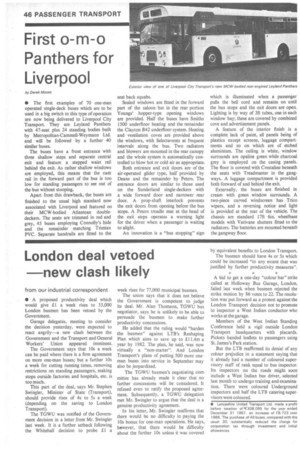London deal vetoed new clash likely
Page 48

If you've noticed an error in this article please click here to report it so we can fix it.
from our industrial correspondent • A proposed productivity deal which would give a week rises to 33,000 London busmen has been vetoed by the Government.
Garage delegates, meeting to consider the decision yesterday, were expected to react angrily—a new clash between the Government and the Transport and General Workers' Union appeared imminent.
The Government says that lOs a week can be paid where there is a firm agreement on more one-man buses; but a further lOs a week for cutting running times, removing restrictions on standing passengers, making stops outside factories and hospitals, etc. is too much.
ThiS part of the deal, says Mr. Stephen Swingler, Minister of State (Transport), should provide rises of 4s to 5s a week (depending on the saving to London Transport).
The TGWU was notified of the Government decision in a letter from Mr. Swingler last week. It is a further setback following the Whitehall decision to probe £1 a week rises for 77,000 municipal busmen.
The union says that it does not believe the Government is competent to judge its deal. Mr. Alan Thomson, TGWU bus negotiator, says he is unlikely to be able to persuade the busmen to make further productivity concessions.
He added that the ruling would "harden the busmen" against LTB's Reshaping Plan which aims to save up to £11.4m a year by 1982. The plan, he said, was now virtually a "non-starter". And London Transport's plans of putting 500 more oneman buses into service in September may also be jeopardized.
The TGWU busmen's negotiating committee has already made it clear that no further concessions will be considered. It refused even to ratify the proposed agreement. Subsequently, a TGWU delegation met Mr. Swingler to argue that the deal is a genuine productivity agreement.
In his letter, Mr. Swingler reaffirms that there would be no difficulty in paying the lOs bonus for one-man operations. He says, however, that there would be difficulty about the further 10s unless it was covered by equivalent benefits to London Transport. The busmen should have 4s or 5s which could be increased "to any extent that was justified by further productivity measures".
A bid to get a one-day "colour bar" strike called at Holloway Bus Garage, London, failed last week when busmen rejected the strike motion by 86 votes to 22. The resolution was put forward as a protest against the London Transport decision not to promote to inspector a West Indian conductor who works at the garage.
Members of the West Indian Standing Conference held a vigil outside London Transport headquarters with placards. Pickets handed leaflets to passengers using St. James's Park station.
But the LTB reaffirmed its denial of any colour prejudice in a statement saying that it already had a number of coloured supervisory staff of rank equal to bus inspector. Its inspectors on the roads might soon include a West Indian bus driver, selected last month to undergo training and examination. There were coloured Underground inspectors and half the LTB catering supervisors were coloured.
• Lancashire United Transport Ltd. made a profit before taxation of 1E308,095 for the year ended December 31 1967. an increase of 8,723 over 1966. The purchase of 49 buses, compared with the usual 30, substantially reduced the charge for corporation tax through investment and initial allowances.








































































































































